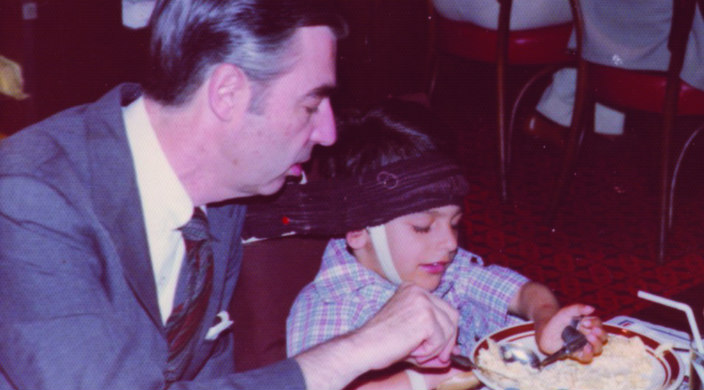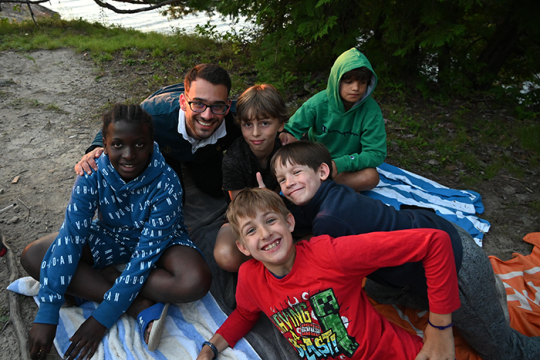
One of this summer’s surprise box office hits is Won’t You Be My Neighbor, a documentary about Fred Rogers and his iconic public television show.
The documentary includes a segment, first aired on February 18, 1981 and rerun annually until 2008, that Fred Rogers considered his “most treasured time on the set” – an unscripted and unrehearsed visit with Jeffrey Erlanger, a 10-year-old Jewish boy who visited Mister Rogers’ Neighborhood in his electric-powered wheelchair.
Mister Rogers asked Jeff, “What is it that made you need this wheelchair?”
“When I was about seven months old,” explained Jeff, “I had a tumor, and it broke the nerves to tell my hands and legs what to do. And they tried to cut the tumor, but they couldn’t do it, and I became handicapped. And I got a wheelchair when I was 4 years old.”
Part way through the conversation, Jeff joined Mister Rogers in an improvised rendition of one of the show’s anthems of acceptance, “It’s You I Like”:
It’s you I like…
Not your fancy chair
That’s just beside youBut it’s you I like
Every part of you
Your skin, your eyes, your feelings…I hope that you’ll remember
Even when you’re feeling blue
That it’s you I like…
After saying goodbye to Jeff, Mister Rogers looked into the camera (he considered the space between himself and the child he was addressing as “holy ground”) and reflected:
“For all of Jeff’s physical problems, he’s such a competent boy. He has learned so much because his mom and dad love him and he loves them. That’s what learning is all about, isn’t it? A lot has to do with love. Jeff is certainly able to talk about his worries. He is able to talk about anything. It’s really great to have a friend like that.”
Fred Rogers first met Jeff five years earlier. With their son about to have risky spinal surgery, Pam and Howie Erlanger asked Jeff what he would most like to do, expecting he’d ask to go to Disney World. He said, “I want to meet Mister Rogers.”
Howie dashed off a letter to Jeff’s hero explaining the situation. Several weeks later, Fred Rogers was having breakfast with the Erlangers at The Pfister Hotel on his trip to Milwaukee. Pam recalls, “After a few minutes of watching us help Jeff feed himself, Fred Rogers said, ‘You know, I would love to help Jeff with his breakfast,’ and he jumped right in and did it just right.”
Five years later, Fred Rogers conceived of a segment with the subtheme of electric vehicles and thought Jeff, with his electric wheelchair, would be the perfect guest. The episode was a hit, “and it did wonders for Jeff’s self-confidence,” Pam says.
At about the same time, the Erlangers heard Jewish singer-songwriter Debbie Friedman, z’l, in concert. “Lisa [Jeff’s older sister] and Jeff loved her music,” recalls Pam, “so we introduced ourselves to Debbie, who said, ‘You would love OSRUI [URJ Olin-Sang-Ruby Union Institute, a Reform Jewish summer camp].’ I looked at her and then at Jeff, who couldn’t feed himself, had no bladder or bowel control, and was prone to illness, and asked, ‘Could Jeff just go to summer camp?’ And she said, ‘Why not?’”
The camp’s leadership had the same response, and Jeff became a camper, counselor, and for a time worked as a receptionist at OSRUI, where, says Pam, “Everyone admired him.”
Responding to Jeff’s needs, the camp became increasingly wheelchair accessible. After graduating from college, Jeff would become a celebrated civic activist in his hometown of Madison, WI, successfully advocating for accessible taxicab service, housing, and other enabling causes. He ran for public office and served on various commissions and committees, earning numerous commendations.
Jeff’s philosophy of life is perhaps best captured in an award-winning PBS promotional spot that featured a montage of images of Jeff and concluded with what would become his credo: “It doesn’t matter what I can’t do…it’s what I can do. That’s how I try to live my life.”
Jeff and Fred Rogers last saw each other in 1998 at the 14th Annual Academy of Television Arts & Sciences Awards in Hollywood, where Rogers received a Lifetime Achievement Award. Jeff, wearing a tuxedo, rolled his wheelchair center stage to the surprise and delight of the honoree, who told the audience that Jeff’s presence was “a wonderful gift.”
Fred Rogers died in 2003. At his memorial service, Jeff was among the invited speakers; others included Yo-Yo Ma and Yitzhak Perlman.
Jeff died in 2007 at age 36. OSRUI director Jerry Kaye paid tribute to Jeff as “a beautiful Jew and dear, sweet man... [who], even though he never stood up…was taller than most people.”
Lisa expressed the belief that her brother’s “spirit and gracious example will live on through all of us.”
That includes all of us who have been touched by Jeff’s inspiring visit to “Mister Rogers’ Neighborhood.”
Photo provided courtesy of the Erlanger family.
For more on Mister Rogers, learn why he was the topic of so many High Holiday sermons this year.
Related Posts

You’re Invited to Remember

Five Jewish AAPI Movers and Shakers

